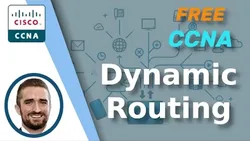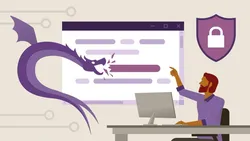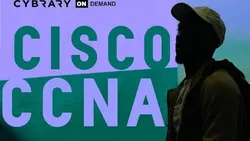
Free CCNA Dynamic Routing Day 24 CCNA 200-301 Complete Course 
This lesson covers the basics of dynamic routing, a process used to update routing tables in a network. It compares dynamic and static routing, and explains the different types of dynamic routing protocols, such as IGP/EGP and distance vector/link state. It also provides an overview of network topology and network route/host route. ▼
ADVERTISEMENT
Course Feature
![]() Cost:
Cost:
Free
![]() Provider:
Provider:
Youtube
![]() Certificate:
Certificate:
Paid Certification
![]() Language:
Language:
English
![]() Start Date:
Start Date:
On-Demand
Course Overview
❗The content presented here is sourced directly from Youtube platform. For comprehensive course details, including enrollment information, simply click on the 'Go to class' link on our website.
Updated in [February 21st, 2023]
What does this course tell?
(Please note that the following overview content is from the original platform)
Introduction.
Things we'll cover.
Network Topology.
Network route/Host route.
Dynamic routing.
Dynamic vs Static routing.
Dynamic routing (cont.).
Dynamic routing summary.
Dynamic routing protocol types.
IGP/EGP algorithm types.
Distance Vector routing protocols.
Link State routing protocols.
Metric.
ECMP with Static Routes.
IGP Metric chart.
Administrative Distance.
Configure AD of a Static Route.
Floating Static Routes.
Things we covered.
Quiz 1.
Quiz 2.
Quiz 3.
Boson ExSim.
We consider the value of this course from multiple aspects, and finally summarize it for you from three aspects: personal skills, career development, and further study:
(Kindly be aware that our content is optimized by AI tools while also undergoing moderation carefully from our editorial staff.)
This course provides an introduction to dynamic routing, covering topics such as network topology, dynamic vs static routing, dynamic routing protocol types, IGP/EGP algorithm types, distance vector routing protocols, link state routing protocols, metric, ECMP with static routes, IGP metric chart, administrative distance, configure AD of a static route, and floating static routes.
Possible Development Paths include becoming a network engineer, network administrator, or network analyst. Learners can also pursue certifications such as CCNA, CCNP, or CCIE.
Learning Suggestions for learners include studying related topics such as network security, network design, and network architecture. Learners should also practice configuring and troubleshooting dynamic routing protocols in a lab environment. Additionally, learners should take practice exams to prepare for certification exams.
[Applications]
After completing this course, students should be able to apply the concepts of dynamic routing to their own networks. They should be able to configure dynamic routing protocols, understand the differences between static and dynamic routing, and be able to configure and troubleshoot dynamic routing protocols. Additionally, students should be able to configure and troubleshoot ECMP with static routes, configure administrative distance of static routes, and configure floating static routes.
[Career Paths]
1. Network Engineer: Network Engineers are responsible for designing, implementing, and maintaining computer networks. They must be knowledgeable in a variety of technologies, including routing protocols, switching, and security. They must also be able to troubleshoot network issues and provide technical support. Developing trends in this field include the use of automation and artificial intelligence to manage networks, as well as the use of cloud-based services.
2. Network Administrator: Network Administrators are responsible for the day-to-day operations of a network. They must be knowledgeable in a variety of technologies, including routing protocols, switching, and security. They must also be able to troubleshoot network issues and provide technical support. Developing trends in this field include the use of automation and artificial intelligence to manage networks, as well as the use of cloud-based services.
3. Network Security Analyst: Network Security Analysts are responsible for ensuring the security of a network. They must be knowledgeable in a variety of technologies, including routing protocols, switching, and security. They must also be able to troubleshoot network issues and provide technical support. Developing trends in this field include the use of automation and artificial intelligence to detect and respond to security threats, as well as the use of cloud-based services.
4. Network Architect: Network Architects are responsible for designing and implementing computer networks. They must be knowledgeable in a variety of technologies, including routing protocols, switching, and security. They must also be able to troubleshoot network issues and provide technical support. Developing trends in this field include the use of automation and artificial intelligence to design and manage networks, as well as the use of cloud-based services.
Course Provider

Provider Youtube's Stats at AZClass
Over 100+ Best Educational YouTube Channels in 2023.
Best educational YouTube channels for college students, including Crash Course, Khan Academy, etc.
AZ Class hope that this free Youtube course can help your Cisco Certification skills no matter in career or in further education. Even if you are only slightly interested, you can take Free CCNA Dynamic Routing Day 24 CCNA 200-301 Complete Course course with confidence!
Discussion and Reviews
0.0 (Based on 0 reviews)
Explore Similar Online Courses

Learning Kali Linux on Windows

Learn PostgreSQL Tutorial - Full Course for Beginners

Python for Informatics: Exploring Information

Social Network Analysis

Introduction to Systematic Review and Meta-Analysis

The Analytics Edge

DCO042 - Python For Informatics

Causal Diagrams: Draw Your Assumptions Before Your Conclusions

Whole genome sequencing of bacterial genomes - tools and applications

CCNA (Cisco Certified Network Associate) Course

Packet Tracer labs for the CCNA 200-301 exam: Practical labs


Start your review of Free CCNA Dynamic Routing Day 24 CCNA 200-301 Complete Course